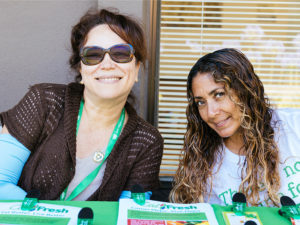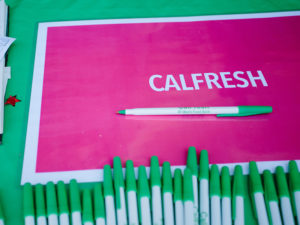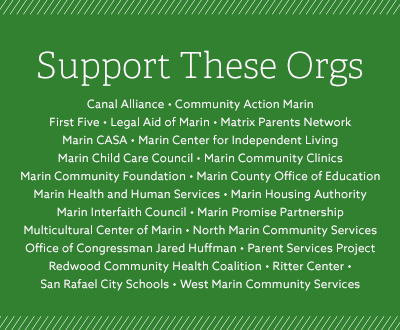 Every other month, Alex is a steering committee member and also meets with the Immigrants’ Rights and Justice Work Group of Marin. She is joined by representatives from nearly two dozen other community organizations.
Every other month, Alex is a steering committee member and also meets with the Immigrants’ Rights and Justice Work Group of Marin. She is joined by representatives from nearly two dozen other community organizations.
As the Food Bank’s Senior Program Manager for CalFresh, Alex has seen firsthand the struggles some immigrant communities face regarding food insecurity. 45% of undocumented immigrants in California are food insecure, according to a report by Food4AllCoalition.
She understands how misconceptions and policies like the Public Charge rules, which deny lawful permanent residency to those who rely on public benefits, can prevent immigrant families from accessing crucial services. While CalFresh isn’t a public charge program, many still won’t apply out of fear. By partnering with fellow organizations in Marin, the Food Bank is able to be part of holistically serving our community and addressing the challenges they face.
We spoke with Alex to learn more about what the Committee is currently focusing on and what their plans are to further reach and support immigrant communities in Marin.
Food Bank: Can you tell us a little more about the Immigrant Rights and Justice Work Group and how it started?
Alex: The Immigrant Rights and Justice Work Group started as a Public Charge Working Group at first. We started to see lack of enrollment in public benefits, such as MediCal, CalFresh, and WIC, rental assistance, and this was due to the Public Charge fears during the Trump administration. So, we started to meet to talk about the challenges and what we were hearing on the ground. We also shared data and started to talk about strategies to support and undo the harm of the Public Charge rule towards the community.
Today, we’re still working with many nonprofits and organizations that represent the diversity of Marin County that work with older adults, children, families, the unhoused community, etc. We [Food Bank] were one of the initial partners that began raising the concern about access to CalFresh.
FB: What inspired you to do this work?
What really inspires me about this work is being able to lead by the voices from lived experience on the barriers to access and work with partners because I’m able to do my work in a multidisciplinary way and address the root causes of hunger. I’m able to listen and understand the challenges that organizations face. I get to hear about how they’re providing resources like rental assistance to clients that are facing high rent and costs while alleviating barriers to fair wages.
To me, food access brings an opening to the world of what more we can be doing. It’s such an ongoing opportunity for me to constantly learn and understand the community. The collective, the partnerships, the on-the-ground work, and overall motivation to help support clients in a holistic way are what inspires me.
FB: What is the Working Group currently focusing on?
We’re currently focusing on these priority areas:
- Ensure access to benefits and services, including disaster-related benefits
- Advance equitable recovery from COVID-19
- Implement federal immigration relief policies
- Reduce educational disparities and inequities
FB: Are there any specific challenges immigrant communities in Marin face?

Alex: Most of the immigrant community in Marin County is from Guatemala, Mexico and El Salvador. So, one challenge is they must navigate languages since not everyone speaks Spanish and there aren’t community interpreters and materials for the Mayan Indigenous community.
The other main challenge overall for the immigrant community is fear in advocating for their rights. The immigrant community feels like they have no voice due to racism against immigration. We also saw that with the pandemic and everything that was happening there were challenges on access to housing, fair wages, education, immigration status, and really understanding the Public Charge rule. So that’s why we’re working with organizations that represent the diversity of Marin County that also work with seniors, children, families, the unhoused, etc.
I’ve also seen more community members getting involved in community meetings and initiatives to talk about the challenges, find ways to get more involved and co-create solutions.
FB: What are you most proud of accomplishing within the Work Group?
I would say that the thing that I’m proud of is just the immediate support everyone provides as challenges occur. I’ve been able to share how we’re able to message around providing food for all in our pantry network and making it a safe space for all.
We also collaborate with First 5 to host forums. Every year they have several educational forums and educate on policy, bring in policymakers, along with Marin Community Foundation and Health and Human Services.
FB: Is there anything else you’d like to share?
 This partnership is crucial. We’re all working in specific areas and in many ways , which can sometimes make us work in a silo. But by broadening and expanding partnerships, as we do in the IRJ Work Group we can do so much more. As a trusted member we can share resources of other organizations, which gives immigrants more ease while they get back on their feet, and that to me is collective impact towards sustainability.
This partnership is crucial. We’re all working in specific areas and in many ways , which can sometimes make us work in a silo. But by broadening and expanding partnerships, as we do in the IRJ Work Group we can do so much more. As a trusted member we can share resources of other organizations, which gives immigrants more ease while they get back on their feet, and that to me is collective impact towards sustainability.
The gratitude that comes from the community is so powerful. They pray for our families and us and give us blessings from their heart. And that to me is priceless.
The Immigrant Rights and Justice Work Group includes the following organizations:
- Canal Alliance
- Community Action Marin
- First Five
- Legal Aid of Marin
- Matrix Parents Network
- Marin CASA
- Marin Center for Independent Living
- Marin Child Care Council
- Marin Community Clinics
- Marin Community Foundation
- Marin County Office of Education
- Marin Health and Human Services
- Marin Housing Authority
- Marin Interfaith Council
- Marin Promise Partnership
- Multicultural Center of Marin
- North Marin Community Services
- Office of Congressman Jared Huffman
- Parent Services Project
- Redwood Community Health Coalition
- Ritter Center
- San Rafael City Schools
- West Marin Community Services



Share